- Clone
- HB14 (See other available formats)
- Regulatory Status
- RUO
- Workshop
- V CD40.5
- Other Names
- BP50, TNFRSF5
- Isotype
- Mouse IgG1, κ
- Ave. Rating
- Submit a Review
- Product Citations
- publications
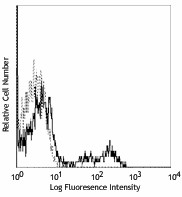
-

Human peripheral blood lymphocytes stained with HB14 PE
| Cat # | Size | Price | Quantity Check Availability | Save | ||
|---|---|---|---|---|---|---|
| 313005 | 25 tests | 80€ | ||||
| 313006 | 100 tests | 168€ | ||||
CD40 is a 48 kD type I glycoprotein also known as BP50. It is a member of the TNFR superfamily primarily expressed on B cells, macrophages, follicular dendritic cells, endothelial cells, fibroblasts, and at low levels on plasma cells. CD40 has been reported to be involved in B cell differentiation, costimulation, isotype class-switching, and protection of B cells from apoptosis. Additionally, CD40 is important for T cell-B cell interactions. The ligand of CD40 is CD154 (CD40 ligand). The HB14 antibody has been reported to promote B cell proliferation in the presence of anti-IgM, IL-4 or PMA, partially block CD40 binding to CD40L and rescue B cells from apoptosis.
Product DetailsProduct Details
- Verified Reactivity
- Human, Cynomolgus, Rhesus
- Reported Reactivity
- African Green, Baboon
- Antibody Type
- Monoclonal
- Host Species
- Mouse
- Formulation
- Phosphate-buffered solution, pH 7.2, containing 0.09% sodium azide and BSA (origin USA)
- Preparation
- The antibody was purified by affinity chromatography, and conjugated with PE under optimal conditions.
- Concentration
- Lot-specific (to obtain lot-specific concentration and expiration, please enter the lot number in our Certificate of Analysis online tool.)
- Storage & Handling
- The antibody solution should be stored undiluted between 2°C and 8°C, and protected from prolonged exposure to light. Do not freeze.
- Application
-
FC - Quality tested
- Recommended Usage
-
Each lot of this antibody is quality control tested by immunofluorescent staining with flow cytometric analysis. For flow cytometric staining, the suggested use of this reagent is 5 µl per million cells in 100 µl staining volume or 5 µl per 100 µl of whole blood.
- Excitation Laser
-
Blue Laser (488 nm)
Green Laser (532 nm)/Yellow-Green Laser (561 nm)
- Application Notes
-
Additional reported applications (for the relevant formats) include: costimulation of B cell proliferation, partial inhibition of CD40 binding to CD40L, and prevention of B cell apoptosis.1 Alone, or in combination with TLR ligands, clone HIB14 stimulates B cells to produce IL-10 and differentiates it into regulatory B10 (IL-10 producing B cells).7 The Ultra-LEAF™ purified antibody (Endotoxin <0.1 EU/µg, Azide-Free, 0.2 µm filtered) is recommended for functional assays (Cat. Nos. 313019 & 313020).
-
Application References
(PubMed link indicates BioLegend citation) -
- Pound JD, et al. 1999. Int. Immunol. 11:11. (Costim)
- Schlossman S, et al. Eds. 1995. Leucocyte Typing V. Oxford University Press. New York.
- Armengol MP, et al. 2001. Am. J. Pathol. 159:861.
- Cavanagh LL, et al. 2005. Arthritis Res. Ther. 7:R230.
- Jayakumar A, et al. 2008. Infect Immun.76:2138. PubMed
- Sestak K, et al. 2007. Vet. Immunol. Immunopathol. 119:21.
- Iwata Y, et al. 2011. Blood. 117:530. PubMed
- Product Citations
-
- RRID
-
AB_314968 (BioLegend Cat. No. 313005)
AB_314969 (BioLegend Cat. No. 313006)
Antigen Details
- Structure
- TNFR superfamily, type I glycoprotein, 48 kD
- Distribution
-
B cells, macrophages, follicular dendritic cells, endothelial cells, fibroblasts
- Function
- B cell differentiation, costimulation, isotype class-switching, rescues B cells from apoptosis
- Ligand/Receptor
- CD154 (CD40 ligand)
- Cell Type
- B cells, Dendritic cells, Endothelial cells, Fibroblasts, Macrophages
- Biology Area
- Cell Biology, Costimulatory Molecules, Immunology, Neuroscience, Neuroscience Cell Markers
- Molecular Family
- CD Molecules
- Antigen References
-
1. Banchereau J, et al. 1994. Annu. Rev. Immunol. 12:881.
2. Foy T, et al. 1996. Annu. Rev. Immunol. 14:591. - Gene ID
- 958 View all products for this Gene ID
- UniProt
- View information about CD40 on UniProt.org
Related FAQs
- What type of PE do you use in your conjugates?
- We use R-PE in our conjugates.
Other Formats
View All CD40 Reagents Request Custom Conjugation| Description | Clone | Applications |
|---|---|---|
| Purified anti-human CD40 | HB14 | FC,Costim |
| FITC anti-human CD40 | HB14 | FC |
| PE anti-human CD40 | HB14 | FC |
| APC anti-human CD40 | HB14 | FC |
| PE/Cyanine7 anti-human CD40 | HB14 | FC |
| PerCP/Cyanine5.5 anti-human CD40 | HB14 | FC |
| APC/Cyanine7 anti-human CD40 | HB14 | FC |
| Ultra-LEAF™ Purified anti-human CD40 | HB14 | FC,Costim |
| APC/Fire™ 750 anti-human CD40 | HB14 | FC |
Customers Also Purchased
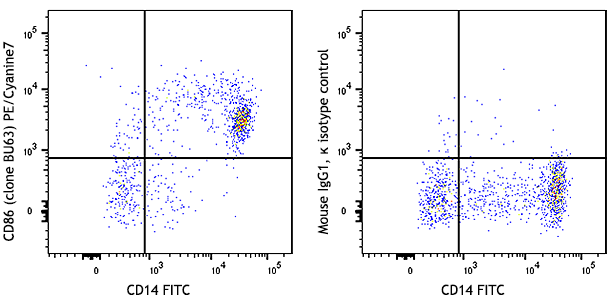
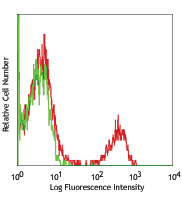
Compare Data Across All Formats
This data display is provided for general comparisons between formats.
Your actual data may vary due to variations in samples, target cells, instruments and their settings, staining conditions, and other factors.
If you need assistance with selecting the best format contact our expert technical support team.
-
Purified anti-human CD40
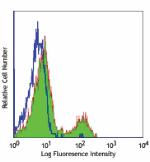
Human peripheral blood lymphocytes stained with purified HB1... -
FITC anti-human CD40
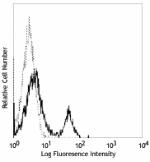
Human peripheral blood lymphocytes stained with HB14 FITC -
PE anti-human CD40
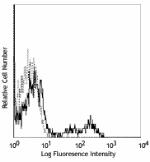
Human peripheral blood lymphocytes stained with HB14 PE -
APC anti-human CD40
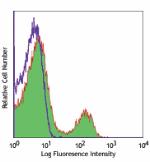
Human peripheral blood lymphocytes stained with HB14 APC -
PE/Cyanine7 anti-human CD40
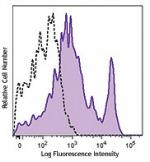
Human peripheral blood lymphocytes stained with CD40 (clone ... -
PerCP/Cyanine5.5 anti-human CD40
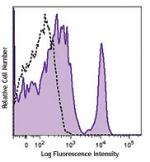
Human peripheral blood lymphocytes were stained with CD40 (c... -
APC/Cyanine7 anti-human CD40
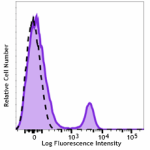
Human peripheral blood lymphocytes were stained with anti-hu... -
Ultra-LEAF™ Purified anti-human CD40

Human peripheral blood lymphocytes stained with purified HB1... -
APC/Fire™ 750 anti-human CD40

Human peripheral blood lymphocytes were stained with CD19 FI...
 Login / Register
Login / Register 










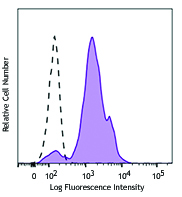
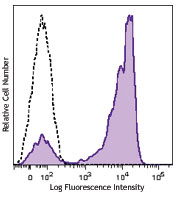



Follow Us